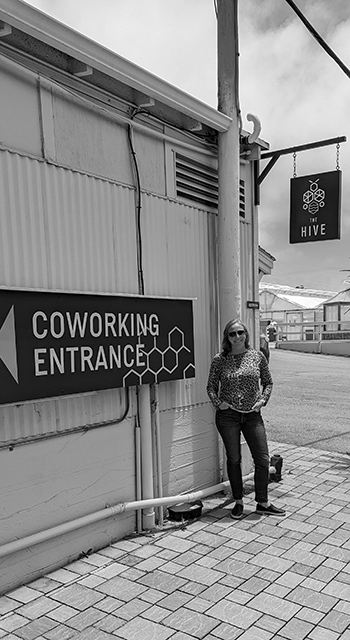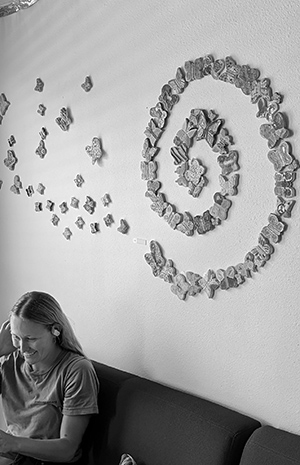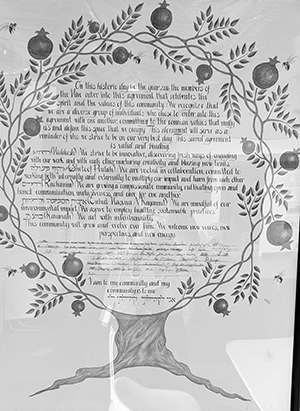 Editor’s Note: This is the 15th chapter in Volume 3 of Editor Emeritus Donald H. Harrison’s 2022 trilogy, “Schlepping and Schmoozing Along the Interstate 5.” All three books as well as others written by Harrison may be purchased from Amazon.com.
Editor’s Note: This is the 15th chapter in Volume 3 of Editor Emeritus Donald H. Harrison’s 2022 trilogy, “Schlepping and Schmoozing Along the Interstate 5.” All three books as well as others written by Harrison may be purchased from Amazon.com.
Schlepping and Schmoozing Along the Interstate 5, Volume 3, Exit 41B (Encinitas Boulevard): Leichtag Commons
From the northbound Interstate 5, take the Encinitas Boulevard exit, and turn right (east) and quickly make a left onto Saxony Road. The Leichtag Commons is on the right side of the street at 411 Saxony Road.


ENCINITAS, California — As a child and later as a college student, Jenny Camhi felt her Jewish connections slipping away. As an adult, in a welcome reversal of fortune, she has been building Jewish connections not only for herself but for the entire North County Jewish community.
While a preschooler in Los Angeles, she had two sets of grandparents living nearby. Her paternal grandparents, Stenia and Steven Mazner, originally from Lodz, Poland, were Survivors of the Holocaust. Her maternal grandparents, Carl and Ethel Levine, were beloved members of Valley Beth Shalom in Encino. Ethel’s needlepoint still hangs inside the synagogue building. Carl’s faithfulness to the congregation found him attending every minyan, forever volunteering. The Levines lived on Densmore Avenue, which runs along the side of the Conservative synagogue that fronts on Ventura Boulevard. Carl affectionately was nicknamed “the mayor of Densmore Avenue.”
When her maternal grandmother died, Valley Beth Shalom’s former spiritual leader, Rabbi Harold Schulweis, joined Rabbi Ed Feinstein and Cantor Herschel Fox in officiating the service in a tribute to the family’s contributions to the congregation.
Jenny’s father, Martin Mazner, had been born in a displaced person’s camp in Germany and his family eventually immigrated to Los Angeles. When business prompted the family to move to Palo Alto, California, Martin and his wife Ruth became active members of Congregation Beth Jacob, participating in a chavurah, while Jenny attended the congregation’s Hebrew school, had a bat mitzvah, and was active in the B’nai B’rith Youth Organization (BBYO). However, “our Judaism only really existed within the walls of our synagogue,” she reflected. “That was where we experienced our Judaism, but in public school and in our neighborhood, the Jewish community was pretty sparse.”
The sense of being less and less encompassed by Jewish life accelerated after she enrolled at Connecticut College, a small liberal arts institution in New London, Connecticut, where she majored in human development. “There wasn’t a strong Jewish community,” she lamented. “I would say I lost my connection with Judaism during that time.” What was especially missing was family – parents, grandparents, and cousins – whom she had relied on to provide that sense of Jewish community.
Following college, Jenny took a job in San Francisco as an office manager for the Bridgespan Group, a management consulting firm for nonprofit organizations. “Through that, I got a lot of exposure to some incredible nonprofit leaders as well as the people I worked with who were really well-connected,” she said. “I realized that what I wanted to do was work directly with people.” Thereafter, she enrolled at San Diego State University on the way to a master’s degree in social work. Shortly after obtaining her MSW, she was introduced to Jeremy Camhi, and “we got serious very quickly.”
By whom to be married was an important question for the young couple. “We didn’t want to be married by a stranger” and at that time, Jenny didn’t know a single Jewish clergy member in San Diego County. That’s ironic because today she works with so many of them! Jeremy’s father had a best friend, Reuven Flamer, today a Chabad rabbi in Spring Valley, New York. Rabbi Flamer said he would marry the couple if Jenny took premarital classes with Nechama Eilfort, the rebbetzin at Chabad of La Costa. After that requirement was met, Rabbi Flamer flew to San Diego and married the couple in 2009 at the Estancia Hotel in La Jolla.
“I had always dreamed that my best friend would sing at my wedding, but that can’t happen during an Orthodox ceremony,” because of the doctrine of kol isha, the voice of a woman, by which Orthodox males are forbidden to hear singing unless the woman is a member of their own family. To accommodate Jenny’s dream, Rabbi Flamer “walked away during that part and allowed her to sing.” He also permitted men and women to sit together during the ceremony.
Meanwhile, Jenny found a job at Mental Health Systems in Kearny Mesa, where she worked with emotionally disturbed youth.
During her pregnancy with her first child, Carly, Jenny met Michelle Tiep, wife of Cantor Billy Tiep of Temple Solel, who was pregnant with her second child. After Carly (named for her maternal grandfather Carl and Jeremy’s grandfather Charlie) was born, Jenny and family moved to Encinitas. At that time, she “had an epiphany that I wanted to work for the Jewish community,” she said. “I thought it must be a great place to be a fulltime working mom because they will understand family values and I can offer my social work in the Jewish community.”
Elaborating during a June 2022 interview, Camhi commented: “I couldn’t bear the thought of being away from my baby all day, every day. I wanted some flexibility. I know that what I was doing wasn’t sustainable. I knew that I was working in a very emotionally taxing job where, essentially, I had to mother 20 teenage boys. I knew having a baby that I could not mother those boys in the way they needed and take care of my own family in the way they needed. I knew I needed a change.”
She applied at various Jewish agencies for a job as a social worker, eventually being hired by Jewish Family Service as the North County Outreach Social Worker which essentially meant “to go out in North County, meet unaffiliated Jews, find out what they are interested in, and how I could connect them and serve them as needed.” The position was funded by the Leichtag Foundation and “that was how my journey as a Jewish professional started. That impacted my personal connections because I was making connections as a part of my job with every Jewish organization and clergy in the community.”
When Carly was two years old, Camhi enrolled her at the Temple Solel preschool, which was fairly close to her home. From 2011 to 2014, Camhi spent most of her time in North County, near daughter Carly, but “I went down to the JFS main office (in the Kearn Mesa neighborhood of San Diego) once a week, and that alone was taking me an hour and a half in the car away from my baby. There is something for me psychologically about being that far from my child, especially with San Diego traffic – maybe I couldn’t get to my kids! For me, family and my children are absolutely number one.”
For the remainder of her working week, she complied with the Leichtag Foundation’s request for “all the grantees to co-work together in their office in Carlsbad, which was still close. I became really close with the other grantees. The people at the Leichtag Foundation became my primary work colleagues, probably closer than the JFS staff, whom I saw only once a week.” Among her co-workers were Laura Cohen (daughter of the then Lawrence Family JCC executive director Michael Cohen) who represented the JCC and Vivien Dean who represented Shalom Baby and PJ Library in addition to colleagues from Hillel and JDC Entwine.
After the Leichtag Foundation purchased from the Ecke flower-growing family the 67.5-acre farm that became the Leichtag Commons, the grantees were asked to relocate to a co-working space at the farm, a happy occurrence for Camhi because it was even closer to home. Before becoming known as “the Commons,” the property often was referred to as the “Leichtag Ranch.”
In 2014, Naomi Rabkin, who had preceded Camhi to the staff of the Leichtag Foundation, told her that there was a position opening for someone to become the official manager of the coworking space. The job was tailor-made for Camhi, who learned about it one day before taking maternity leave for the birth of her second child, Spencer. (He was named for his paternal great-grandfather, Stephen Mazner, the Holocaust Survivor.)

While in Carlsbad, the coworking space had been known as “the North County Jewish Hub” because “there was an organization that was very similar in London called the JHub and we were modeling ourselves after JHub,” Camhi said. However, a few years after moving to the Leichtag Commons in Encinitas, where a variety of organizations worked in a 13,000-square-foot remodeled processing facility, Yedediah Greenberg, representing the Jewish Initiative for Animals, commented how busy the place was, like the beehive of the property. Camhi smiled at Rabkin, who previously had suggested that the Hub be renamed the Hive, and it was agreed to rebrand the coworking enterprise.
When Camhi first took over as manager, her initial task “was really about putting some formal structures into place. When I was part of the Hive as a grantee, it was sort of ambiguous about what we were doing there, what were the expectations. I think that was intentional on the part of the Foundation; like, ‘We don’t want to put parameters on you; go play and create. We want to see what you will come up with.’ But being on the other side of it, I realized that in order to get really creative, sometimes you need to give people the boundaries of where they can and cannot go and what you expect of them.”
“It turned out that people needed a little more hand holding and guidance,” Camhi continued. “Initially, we said, ‘We want to see all of you holding programs here; so, if you are JFS and you are holding a parenting class, we want it to be here at the property, at least some of the time. And if you are Shalom Baby, and you are hosting a story time, let’s do it on the Commons.’ When the Foundation coordinated the first Sukkot at the Ranch, it meant we needed the Hive members to lead and staff that. In the beginning, expectations hadn’t been made explicit, so part of my job was saying these are the expectations. Also, what does it mean to be in a coworking space? It is not to sit in your office with the door closed. You are expected to participate in our lunch-and-learns and our Friday breakfast together. You are expected to ‘eavesdrop’ and mingle and interact, because just being near can facilitate a lot of interactions.”
When asked why they worked in offices rather than out in the common are, the grantees explained that “there was no comfortable place to sit, and there are no outlets to plug in a computer.” In response, “We invested quite bit to get ergonomic furniture in the center. Today, people work in their offices and then when they think they need some interactions, there are great places to work together in the center.”
In its early days on the property, the Leichtag Foundation “started a program called ‘Jewish Food Justice Fellows’ and they recruited seven people from around the county and from Israel, who moved to San Diego, lived on the property and worked with organizations around San Diego who were doing food justice. When their fellowships were over, some of them stayed in North County. One of them, a woman by name of Aviva Paley, cofounded a nonprofit group called ‘Kitchens for Good,’” which taught culinary skills to vulnerable populations, utilizing produce that otherwise would have been thrown away. “She said to me, ‘can I work out of the Hive? I am starting this new business after the Fellowship.’ Of course, we wanted her to stay close, so we said yes. Kitchens for Good if you look them up, is one of the best-known nonprofits in San Diego.
“Once Aviva and the Kitchens for Good were here, then an organization called Produce Good wanted to come too because they work hand-in-hand with Kitchens for Good. They started off going to private homes around San Diego County and picking their excess fruit and donating it to the emergency food system. The next thing you know, the San Diego Hunger Coalition, feeding hungry people in San Diego, and the San Diego Food Systems Alliance came, and it became a snowball reaction.”
A ranking official of Blue Star Families, which supports the families of military personnel, lived in the vicinity of the Leichtag Commons and asked if she could work out of the Hive. She was followed by a representative of a group called “Support the Enlisted Project.” So, said Camhi, “we have all these buckets of military organizations, Jewish nonprofits, and those working in food assistance.”

While not everyone was Jewish, “we had a community ketuba of values” in which it was agreed that “we all come from different faith backgrounds, but we can agree that innovation, caring for one another, caring for the environment, and acting with intention were the things that we all wanted to do. So, we had one of our Hive members create a community ketuba (a written contract, usually for marriages.) We illustrated it and we all signed it.”
The focus on food justice and access at Leichtag Commons led eventually to the creation of the Coastal Roots Farm, which grows food to help sustain people in need, including military families. (That organization’s work is discussed in the preceding chapter about Javier Guerrero).
A major component and early member of the Hive is the international headquarters of Moishe House, a group that encourages people in their 20s and 30s to create Jewish communal opportunities for other young adults. (Moishe House is discussed in a previous chapter focusing on Terry Wunder of Temple Solel, who had served as an executive with Moshe House before joining that Reform congregation as its director of community engagement.)
Pre-COVID-19 PANDEMIC, THE Hive had approximately 35 organizations working together. Among them was the “Entwine” program of the American Jewish Joint Distribution Committee (JDC), which sponsored fact-finding trips for North County Jewish residents to the Jewish community of Buenos Aires, Argentina. Initially staffed by Jonathan Goldstone, who subsequently decided to become a nurse, it was taken over by Elizabeth Kirtis, who had been working for Hillel International in Washington D.C. Married to Ben Weinrib, with whom she has three sons, the family recently decided to move to Encinitas. For Camhi, that is what it is all about, attracting committed members of the Jewish community to help Jewish institutions grow.
“Seeing the Hive coworking space as a source of Jewish connection for our members has been one of the most satisfying experiences for me,” Camhi said. “Watching Hive members, many of whom relocated to Encinitas for their jobs, find life partners, plant roots here and raise families has been incredibly special.”
During the pandemic, the number of organizations working at the Hive diminished, their representatives preferring to work in the safety of their homes. Now, however, as the pandemic eases and as numerous outdoor spaces, considered to be safer venues than those inside, have been created at Leichtag Commons, there is optimism that the Hive will again be buzzing.
“I see the Hive coming back to where we were pre-pandemic and then some,” Camhi told me. “There are so few places that can offer an indoor/outdoor arrangement with the beauty and safety that the Hive has to offer. I want to see more community gatherings and learning opportunities. That used to be a huge part of what we did pre-pandemic. We would learn about the Holidays together, or watch an intellectual movie and talk about it, and I hope we get back to that place. We have something to offer local nonprofits. We can meet event needs year-round in an outdoor environment. The fact is we can do a Shabbat dinner outside, watching the sunset, with some really interesting speakers and content. We can provide experiences that are an entry into Judaism that they never have experienced before.”
Further, she said, her hope is that the Hive will “become a source of connection for the Jewish community In the early days, I used to hear a lot that people grew in their sense of being Jewish just by being in the coworking space. My hope is to grow that going forward.”
*
Donald H. Harrison is editor emeritus of San Diego Jewish World. He may be contacted via donald.harrison@sdjewishworld.com